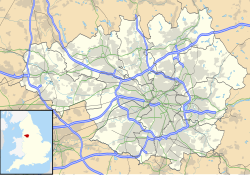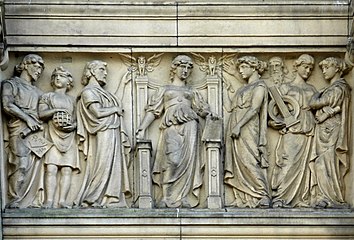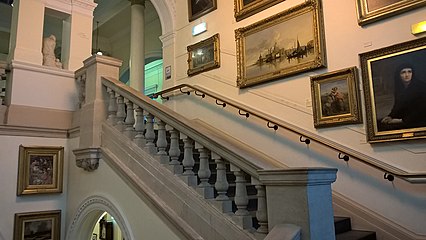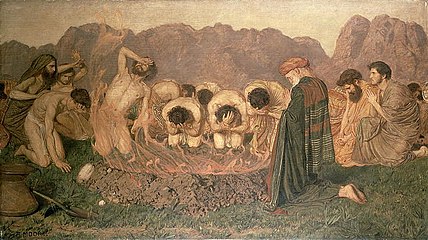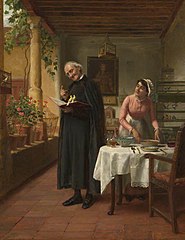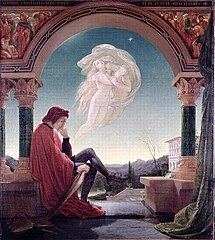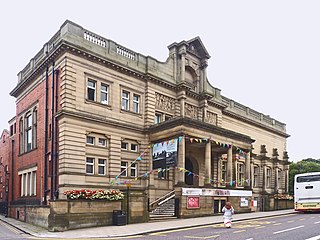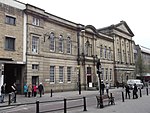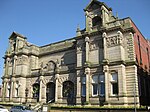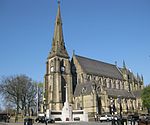Bury Art Museum
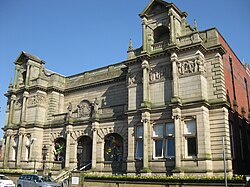 Bury Art Museum with Bury Central Library | |
| Established | 9 October 1901 |
|---|---|
| Location | Moss Street, Bury |
| Coordinates | 53°35′30″N 2°17′55″W / 53.5917°N 2.2986°W |
| Type | Art museum |
| Collection size | approx. 62,000 objects |
| Public transit access | Bury Interchange |
| Website | buryartmuseum.co.uk |
Bury Art Museum and Sculpture Centre, formerly known as Bury Museum and Art Gallery, is a public museum, archives, and art gallery in the town of Bury, Greater Manchester, northern England, owned by Bury Council. Built in 1901, the museum's buildings were restored and reopened in 2005.[1]
History
[edit]Bury Art Museum's collection was established, in commemoration of Queen Victoria's Diamond Jubilee in 1897, with the gift of more than 200 oil paintings, watercolours, prints and ceramics accumulated by the Victorian paper manufacturer Thomas Wrigley (1808–1880), on the condition that suitable premises should be built to house the collection. The present building was designed by the Manchester firm of Woodhouse and Willoughby, and was opened by Frederick Stanley, 16th Earl of Derby on 9 October 1901. The town's Museum opened in the basement of the Art Gallery in 1907.[2]
Collections
[edit]The museum's Wrigley Collection is an assemblage of more than two hundred oil paintings, watercolours, prints and ceramics, which includes works by J. M. W. Turner, John Constable, Edwin Landseer, and George Clausen. Donations of other artworks quickly followed the museum's opening, including donations from the town's Member of Parliament James Kenyon (1846–1924) and many others. Other paintings include works by Henry Dawson, John Bagnold Burgess, and Joseph Noel Paton. There are twentieth-century paintings by artists such as Victor Pasmore and Edward Burra, and the museum also holds more recent twenty-first-century art works.[2]
Restoration
[edit]In 2005, a £1.2 million refurbishment was carried out, designed to provide a brand new museum, art gallery and library all under one roof. This includes a combined Museum and Archives Centre which, based on a radical re-think, uses artefacts, documentation and art to tell the story of the town.[3] The council decided, in 2006, to sell Lowry's painting The Riverbank at auction in order to fund part of its social services budget shortfall which resulted in the Museums, Libraries and Archives Council (MLA) removing its accredited museum status.[4] Bury Museum and Art Gallery was renamed as Bury Art Museum in 2011. The most recent renovation includes modern artefacts such as iPods and electric iRobot vacuum cleaners.
Gallery
[edit]-
Detail from the Frieze, Bury Art Museum
-
Frieze, Bury Art Museum
-
Staircase, Bury Art Museum
-
Albert Joseph Moore, Elijah's Sacrifice (1863)
-
John Bagnold Burgess, A Modern Saint Francis
-
Henry Dawson, An English Lake
-
Joseph Noel Paton, Dante Meditating
-
Exeterior, Bury Art Museum
See also
[edit]References
[edit]- ^ "Bury Art Gallery, Museum & Archives". Culture24. Retrieved 11 September 2011.
- ^ a b "Art UK: Bury Art Museum". Art UK. Retrieved 5 August 2022.
- ^ Honeyford, Kate (13 May 2005), Bury Museum Open Again After Re-fit for the 21st Century, 24 Hour Museum, retrieved 1 August 2009
- ^ Lowry sale council loses status, BBC News, 15 December 2006, retrieved 1 August 2009
External links
[edit]- Bury Art Museum and Sculpture Centre
- Bury Art Museum and Sculpture Centre at Bury Council website
- Bury Art Museum at Visitbury.com
- Grade II listed buildings in the Metropolitan Borough of Bury
- Museums in Greater Manchester
- Art museums and galleries in Greater Manchester
- Local museums in Greater Manchester
- Tourist attractions in the Metropolitan Borough of Bury
- Art museums and galleries established in 1901
- 1901 establishments in England
- Culture in Bury

